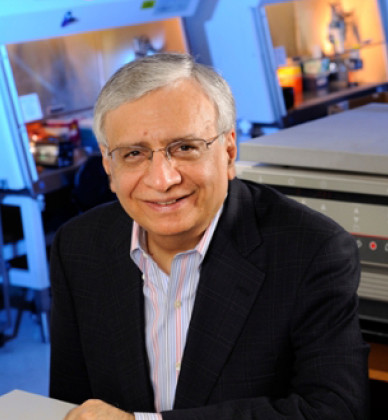Rafi Ahmed, Ph.D.
Vaccine Development
Emory University
Recruited: 1995
It is not an overstatement to say that Rafi Ahmed has transformed knowledge of how the immune system responds to long-term illness. His findings have informed a new class of cancer immunotherapy drugs, including some in use today and others in development.
As the founding and current director of the Emory Vaccine Center – the world’s largest vaccine research enterprise housed at a university – Ahmed leads a team of 280 scientists. Since its founding in 2006, the Center has attracted more than $1 billion in outside grants and contracts.
For decades, Ahmed’s research has focused on T-cells, the immune system’s white blood cell-defenders that seek and destroy antigens such as viruses, bacteria or allergens. In a series of important discoveries, Ahmed uncovered a number of interesting insights into how this system works. He was the first to demonstrate that T-cells operate based on memory, enabling them to launch more aggressive defenses against previously encountered antigens. Ahmed next showed that T-cells retained their innate memory of a particular antigen even when no longer exposed to it; he proved that the memory of T-cells was longer than previously imagined.
These findings set the stage for Ahmed’s biggest discovery yet. While T-cells demonstrated a long memory for antigens, they lose their ability to attack in the presence of long illness – a situation that baffled researchers for almost a century. Together with his colleagues, Ahmed launched a project to compare and contrast active T-cells and exhausted T-cells. To do this, they analyzed T-cells in a population of mice infected with a chronic case of lymphocytic choriomeningitis, compared with the T-cells of healthy mice.
Their research brought an extraordinary finding: Inactive T-cells lose their ability to fight in chronic disease because, over time, they become covered with a surface cell receptor called PD-1. When this surface receptor binds to a ligand (called PD-L1) on an invading molecule or antigen, a message is sent to the T-cell: Don’t attack.
Ahmed and his team realized that if they could keep this binding from occurring, then T-cells would stay in the fight rather than lay down their arms. So they suggested that a drug designed to bind to PD-1 or PD-L1 — blocking the interaction between the two — could offer a breakthrough treatment for chronic disease.
The drugs they proposed are today known as immune checkpoint inhibitor drugs. Currently, a number of immune checkpoint inhibitor drugs that target PD-1 and PD-L1 have been approved by the FDA for certain cancers, or are in late-stage clinical testing at top pharmaceutical companies.
Continuing his work with T-cells and the immune system, Ahmed and his team are turning their attention to potential immune checkpoint inhibitors for chronic viral infections like HIV and Varicella-zoster virus.
Another Ahmed project has yielded a new method for encouraging the development of antibodies after a vaccination and generating cross-reactive antibodies with broad immunity. The team is applying these studies toward work on a potential universal flu vaccine. By ensuring long-term immunity against the dozens of fast-evolving flu strains that emerge from season to season, a universal flu vaccine would save many lives around the world.
Research
- Memory T-cell differentiation and antiviral T- and B-cell immunity
- Antigen-specific immunological memory in murine, primate and human systems
- Cellular molecules that regulate the generation and maintenance of CD8 and CD4 T-cell and humoral immunity, including mTor
- Inhibitory receptors beyond PD-1
- Generating human monoclonal antibodies post-vaccination
- AIDS vaccine, progressing through human clinical trials
- Broad antibody protection against influenza based on the 2009 H1N1 flu virus
Choosing Georgia
GRA recruited Ahmed to Georgia to become director of a world-class vaccine center. GRA invested $10 million to create the center and added significant investments in technology and talent over time.

